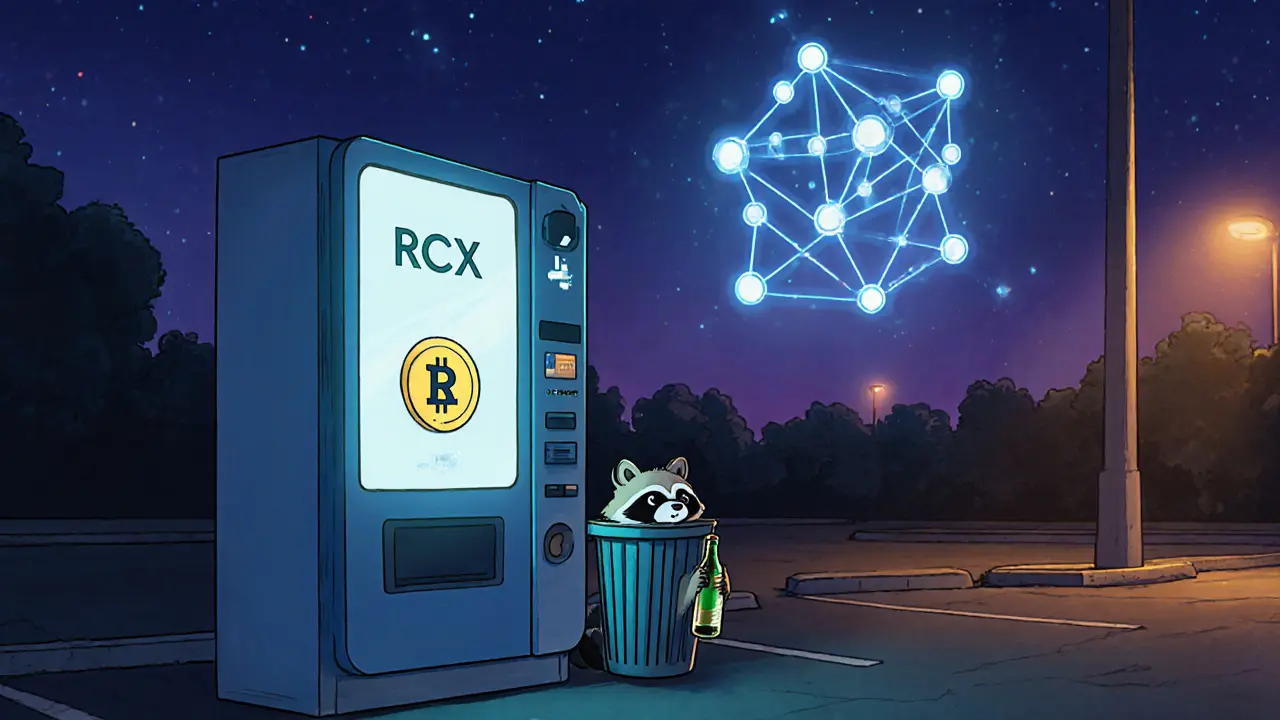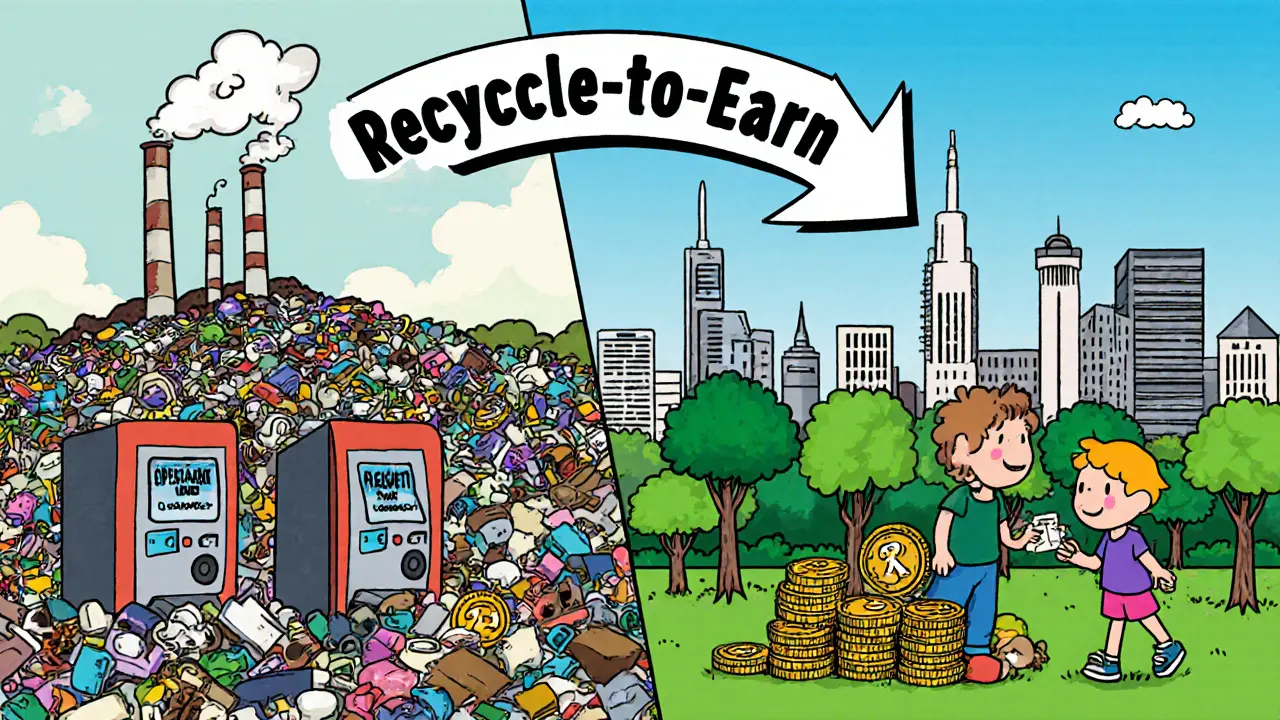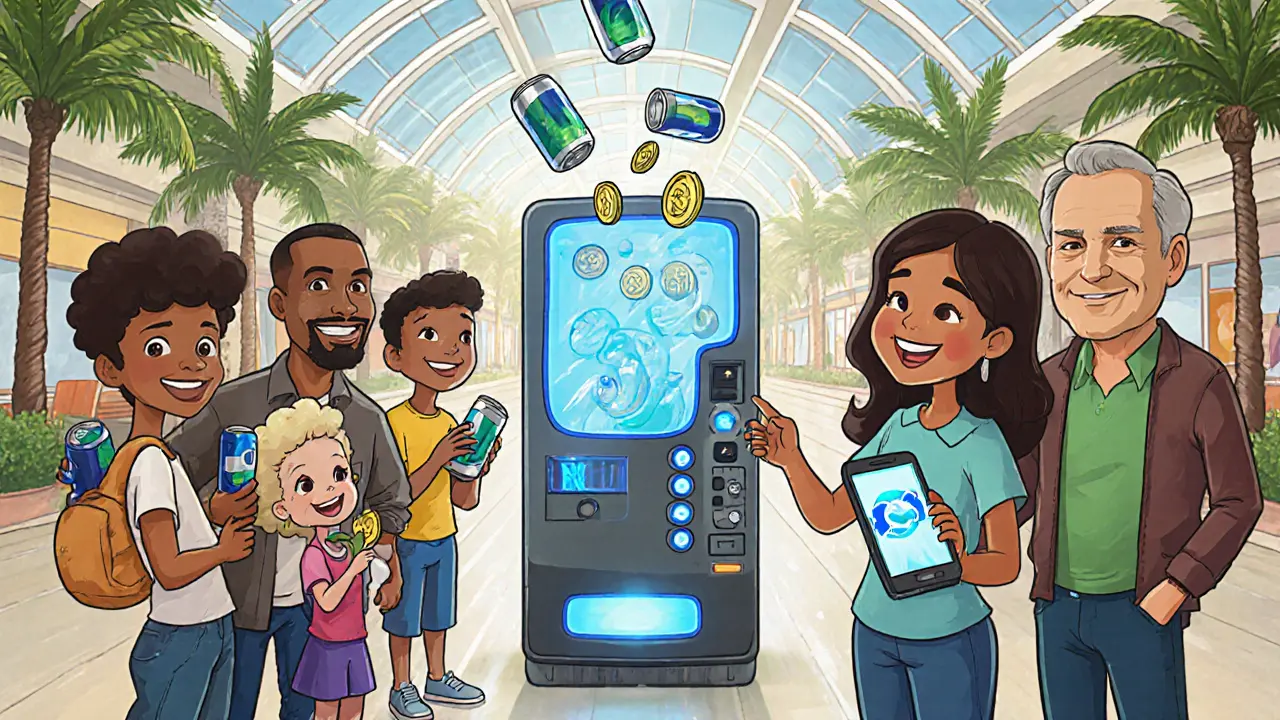RecycleX Earnings Calculator
Estimate your potential RCX token earnings based on recyclable materials processed by RecycleX machines. Note: Values are approximate and subject to market volatility.
Estimated Earnings
Important Risk Disclaimer
RCX token value is highly volatile and subject to extreme price swings. Current exchange rates (e.g., $0.02-$0.03) are for estimation only. Actual earnings may vary significantly due to low liquidity, market manipulation, and lack of verified machine locations. This calculator assumes current market rates but does not account for future volatility. Only invest what you can afford to lose.
RecycleX (RCX) isn’t just another crypto coin. It’s a digital token tied to something you can touch: plastic bottles, aluminum cans, and other recyclables you throw into a machine. The idea is simple - RecycleX pays you in RCX tokens every time you recycle. No guesswork. No theory. You drop something in, you get something out. That’s the Recycle-to-Earn (R2E) model, and RecycleX claims to be the first to make it work at scale.
How RecycleX Actually Works
You don’t need a mining rig or a fancy wallet to start with RecycleX. You need a plastic bottle and a Recycling Vending Machine (RVM). These machines are placed in public spots - malls, schools, parking lots - where people already go. You insert your recyclables. The machine uses AI and IoT sensors to identify what you dropped in, weigh it, and sort it automatically. Then, it credits you with points. Those points get converted into RCX tokens and sent to your mobile wallet.
It’s not magic. It’s a system built on Binance Smart Chain (BSC), with a smart contract at 0x6fb8889b3c5d79a4c855d4de56ce3b742d8e0eba. The whole process is recorded on the blockchain. No one can cheat the system. You get what you recycle. The machine doesn’t lie. And the tokens? They’re yours to hold, trade, or stake.
Tokenomics: Supply, Allocation, and Value
There are 1.5 billion RCX tokens total. That’s a fixed number. No more will ever be created. Here’s how they’re split:
- 25% - Recycle-to-Earn rewards (for users like you)
- 25% - Ecosystem development and treasury
- 15% - Team and founders
- 10% - Seed investors
- 10% - Public sale
- 10% - Marketing and partnerships
- 5% - Advisors
The team says they burn a portion of fees from every transaction and use revenue from selling recycled materials to buy back RCX tokens. That’s meant to reduce supply over time and support the price. But here’s the catch: no one’s auditing those buybacks. You can’t see the money moving. You just have to trust the whitepaper.
Where You Can Trade RCX
RCX isn’t on Binance or Coinbase. You won’t find it on the big exchanges. It’s listed on smaller ones: LBank, MEXC, and a few others. Prices vary wildly between them. On Binance Smart Chain, you might see RCX at $0.02. On LBank, it’s $0.0201. Coincarp says $0.031. Why the difference? Low liquidity. Few people are trading it. One day, the price jumped 647% in 24 hours. The next day, it dropped 1.75%. That’s not market movement - that’s a thin market with a few big buyers and sellers.
The 24-hour trading volume? Around $1,300. For comparison, Bitcoin trades over $20 billion in the same time. RCX trades less than a single Bitcoin transaction. That’s not a sign of strength. It’s a sign of risk.

Real-World Use: Where Are the Machines?
This is where RecycleX gets tricky. The website talks about global expansion, DePIN infrastructure, and AI-powered sorting. But where are the machines? There’s no public map. No list of cities. No photos of RVMs in action. No user testimonials from people who actually earned RCX this week.
The project says it’s in "Comprehensive Preparations for Global Expansion." That sounds like they’re still building. Not running. If you live in New York, Tokyo, or Berlin, you probably won’t find a RecycleX machine nearby. And if you can’t use the system, the token has no real utility beyond speculation.
Is RecycleX Different From Other Green Coins?
Yes - and no. Projects like Plastic Bank also pay people for recycling. But Plastic Bank works with NGOs and physical redemption centers. RecycleX wants to automate everything with machines and blockchain. That’s the differentiator. But automation doesn’t mean adoption. If the machines don’t exist, the blockchain doesn’t matter.
Other crypto projects claim to be "green" by using proof-of-stake or carbon offsets. RecycleX tries to do something harder: turn trash into cash in real time. If it works, it’s revolutionary. If it doesn’t, it’s just another token with a nice story.

Red Flags and Risks
Let’s be blunt. There are warning signs.
- No third-party audits - The smart contract hasn’t been reviewed by a security firm. You’re trusting code no one has tested.
- Future price dates - One data site claims RCX hit its peak on September 5, 2025 - a date that hasn’t happened yet. That’s either a glitch or a fake metric.
- Conflicting data - Market cap varies from $46 million to under $1 million across platforms. Token supply is listed as both 1 billion and 1.5 billion. That’s not confusion - it’s lack of transparency.
- No community - No active Reddit threads. No big Twitter following. No reviews on CoinGecko or CoinMarketCap beyond raw numbers. If thousands of people were earning RCX daily, you’d hear about it.
And yet, the project is still live. The website updates. The token trades. People are still buying it. Why? Because the idea is powerful. People want to believe recycling can pay off. And if you’re willing to take a risk on a project with no track record, RCX gives you a shot.
Should You Buy RCX?
If you’re looking for a stable investment - walk away. RCX is not Bitcoin. Not Ethereum. Not even a mid-cap altcoin. It’s a speculative bet on a real-world system that hasn’t been proven yet.
If you live near a RecycleX machine and you recycle anyway - sure, grab some tokens. Use them. See if the system works. Maybe you’ll earn a few dollars’ worth of RCX over time. That’s not investing. That’s recycling with a bonus.
If you’re buying RCX because you think it’ll go up 10x next month - you’re gambling. And you’re gambling on a project with no audited code, no verified user base, and no physical infrastructure you can see.
What’s Next for RecycleX?
The roadmap says: expand RVMs, add more materials (glass, electronics), partner with cities, and integrate with local waste management. But there’s no timeline. No progress reports. No public updates since 2023.
Without transparency, RecycleX remains a concept - not a company. The blockchain part is solid. The token model makes sense on paper. But without machines in the real world, RCX is just a digital promise. And promises, no matter how green, don’t pay bills.
For now, RecycleX is a high-risk experiment. It could become the first crypto project to turn recycling into a global economy. Or it could fade into obscurity, like hundreds of others before it. The difference? This one asks you to actually do something - drop a bottle in a machine - before you get paid. That’s rare. And that’s why it’s worth watching.
Is RecycleX (RCX) a real cryptocurrency?
Yes, RCX is a real token built on the Binance Smart Chain with a public contract address. But it’s not listed on major exchanges, has extremely low trading volume, and lacks third-party audits. Its value comes from its intended use in a recycling rewards system - not from market demand.
Can I earn RCX tokens without a Recycling Vending Machine?
No. RCX tokens are earned by depositing recyclables into official RecycleX RVMs. Without access to one of these machines, you can’t earn tokens through the Recycle-to-Earn system. You can only buy them on small exchanges - but that’s speculation, not earning.
Where can I buy RCX tokens?
RCX is available on smaller exchanges like LBank, MEXC, and Bitrue. It’s not on Binance, Coinbase, or Kraken. Prices vary widely between platforms due to low liquidity. Always check multiple sources before buying.
Is RecycleX safe to invest in?
It’s high-risk. There are no security audits, no verified user numbers, and no public data on how many machines are operating. The price is extremely volatile, and the project’s claims are hard to verify. Only invest what you’re willing to lose.
Does RecycleX have a mobile app?
Yes. The RecycleX wallet app lets you store, send, and stake RCX tokens. It also connects to the RVM system to show your recycling history and rewards. But the app won’t do anything unless you’re near a machine. It’s not a standalone crypto wallet like MetaMask.
Can I stake RCX tokens?
Yes, according to the RecycleX website, users can stake RCX to earn governance tokens. But there’s no public data on APY, minimum staking amounts, or how long staking periods last. No one has verified these claims. Proceed with caution.
Why is RecycleX’s market cap so inconsistent?
Because RCX trades on low-volume exchanges with minimal liquidity. Different platforms use different formulas to calculate market cap, and some include tokens that aren’t circulating. The project also has conflicting data on total supply (1 billion vs. 1.5 billion), which adds to the confusion.
What happens to the recycled materials after they’re collected?
The RVMs sort and compress materials like plastic and aluminum. These are then sold to recycling processors. The revenue from those sales helps fund the RecycleX ecosystem and may be used to buy back RCX tokens. But there’s no public reporting on how much material is collected or how much revenue is generated.

10 Comments
I live in Cape Town and I saw one of these machines last month at the mall
It actually worked! I got 12 RCX tokens for 8 bottles and a can
Not much but it felt good to get paid for something I was gonna recycle anyway
Wish they had more of them though
It’s fascinating how this project attempts to bridge the physical and digital worlds, isn’t it? I mean, on paper, the tokenomics are sound-fixed supply, buybacks, ecosystem incentives-but the real question is whether the infrastructure can scale without collapsing under its own ambition.
And yet, I find myself rooting for it, because the idea of turning environmental responsibility into tangible, blockchain-backed reward is so beautifully simple, even if the execution is still in its infancy.
It’s not just crypto-it’s behavioral economics with a conscience, and that’s rare.
Still, I’d love to see independent audits, public machine logs, and real-time recycling metrics before I stake anything.
So we’re betting on trash now
That’s the future I guess
Machine sees bottle, machine gives you crypto
Meanwhile my phone tells me to recycle but doesn’t pay me
Maybe I’m just old
Or maybe this is how capitalism evolves-by turning every action into a transaction
Either way, I’m not buying but I’ll watch
RCX is a scam
Low volume fake market cap no audits
And who cares about machines if they dont even exist
Its just another rug pull with a greenwash label
Stop falling for this eco-crypto nonsense
Its all just pump and dump with bottles
Back home in Mumbai, we have these manual collection centers where people get paid in cash for plastic-usually less than a dollar a kilo
But imagine if they could get crypto instead, especially for people who don’t have bank accounts
RCX could be huge here if they just put a few machines in slum areas or near schools
The tech is cool but the real win is financial inclusion
Not every crypto project can say that
Still, yeah, no machines = no real value
Hope they expand soon
They’re using this to track your recycling habits and sell your data to corporations
And the blockchain? Just a fancy ledger to hide where the money really goes
Remember when they said Bitcoin was anonymous? It wasn’t
Same thing here-your bottle deposits are logged, tied to your wallet, and sold to advertisers
They’re not saving the planet-they’re monetizing your guilt
Let’s break this down properly
First, the tokenomics: 1.5B total supply, 25% allocated to users-that’s 375M tokens for rewards
If you assume 10 million active users over five years, that’s 37.5 tokens per user on average
At $0.02, that’s 75 cents per person over five years
So you’re talking about 15 cents a year per person for recycling
Meanwhile, the cost to deploy, maintain, and service one RVM is estimated at $8,000–$12,000
So unless they’re deploying tens of thousands of units, this is mathematically unsustainable
And that’s before considering logistics, power, AI calibration, and fraud detection
It’s a beautiful idea, but the economics don’t close
And if the buybacks aren’t audited, it’s just a promise written in vapor
Anyone who buys this is an idiot
Low volume, no audits, no machines, fake price charts
It’s not even a gamble-it’s a joke
People are literally throwing money at a PowerPoint
And the worst part? They think they’re being green
They’re not helping the planet-they’re helping scammers
Stop it
I like the idea but I’m waiting to see real data
How many machines are live?
How many people are actually earning?
What’s the average daily reward?
Without those numbers, it’s just a story
And stories don’t pay bills
But if someone proves it works, I’ll give it a shot
RecycleX represents a novel attempt at aligning economic incentives with environmental behavior. The use of blockchain for transparent reward distribution is technically sound, assuming the smart contract is secure. However, the absence of third-party audits, verifiable deployment metrics, and public operational data severely undermines trust. For any system relying on physical infrastructure, real-world adoption must precede speculative investment. Until independent verification confirms machine deployment and token distribution, RCX remains a theoretical construct with high risk and unproven utility. Investors should treat it as a high-risk experimental asset, not a financial instrument.